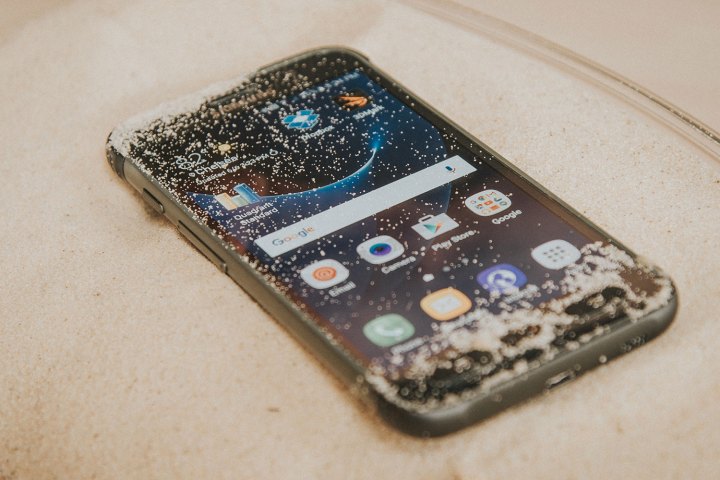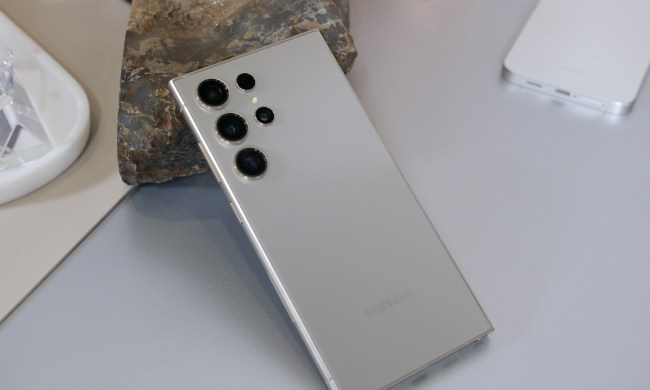
Thankfully, Samsung appears to have taken the same approach with the Galaxy S8 Active. The result is a tried-and-true flagship that doesn’t skimp on anything to deliver the most durability in the segment. Read on to find out how the S8 Active stacks up against its predecessor.
Specs and performance
|
Samsung Galaxy S8 Active  |
Samsung Galaxy S7 Active  |
|
| Size | 151.9 x 74.9 x 9.9mm (5.98 x 2.95 x 0.39 in) | 148.8 x 74.9 x 9.9 mm (5.86 x 2.95 x 0.39 in) |
| Weight | 7.34 ounces (208 grams) | 6.53 ounces (185 grams) |
| Screen | 5.8-inch Quad HD+ Super AMOLED flat | 5.1-inch Quad HD Super AMOLED |
| Resolution | 2,960 x 1,440 | 2,560 x 1,440 |
| OS | Android 7.0 Nougat | Android 7.0 Nougat |
| Storage | 64GB | 32GB |
| SD Card Slot | Yes | Yes |
| NFC support | Yes | Yes |
| Processor | Qualcomm Snapdragon 835 | Qualcomm Snapdragon 820 |
| RAM | 4GB | 4GB |
| Connectivity | 4G LTE, GSM, CDMA, HSPA+, 802.11a/b/g/n/ac Wi-Fi | 4G LTE, GSM, CDMA, HSPA+, 802.11a/b/g/n/ac Wi-Fi |
| Camera | 12MP rear with OIS, 8MP front | 12MP rear with OIS, 5MP front |
| Video | 4K | 4K |
| Bluetooth | Yes, version 5 | Yes, version 4.2 |
| Fingerprint sensor | Yes | Yes |
| Other sensors | Accelerometer, ambient light, compass, GPS, gyroscope, Hall, heart rate, iris scanner, proximity | Accelerometer, ambient light, compass, GPS, gyroscope, heart rate, proximity |
| Water Resistant | Yes, IP68 and MIL-STD-810G | Yes, IP68 and MIL-STD-810G |
| Battery | 4,000mAh | 4,000mAh |
| Ports | USB Type-C, 3.5mm headphone jack | Micro USB, 3.5mm headphone jack |
| Charging | Quick charging, Qi/PMA wireless charging | Quick charging, Qi/PMA wireless charging |
| Color | Meteor Gray, Titanium Gold | Camo Green, Titanium Gray, Sandy Gold |
| Marketplace | Google Play Store | Google Play Store |
| Price | $850, or $28.34 per month for 30 months | $695, or $23 per month for 17 months |
| Availability | AT&T | AT&T |
| DT Review | N/A | 4 out of 5 stars |
The S7 Active was at the bleeding edge of mobile hardware last year, and the same is true of the S8 Active today. The S8 Active has a newer Qualcomm Snapdragon 835 processor. It features the same 4GB of RAM as last year’s model, though the amount of internal storage has seen a sizable bump: 64GB, up from 32GB in the S7 Active. Both phones feature MicroSD slots for expansion up to an additional 256GB.
To tip the scales even further in the S8 Active’s favor, the new model features Bluetooth 5.0. The S7 Active made do with only version 4.2, which has half the data transfer speed, and cannot pair to more than one device at a time.
In terms of power and performance, there’s really no contest. The Galaxy S7 Active would still be plenty fast for just about anyone, but the S8 Active is simply a generation ahead.
Winner: Galaxy S8 Active
Design
Where design is concerned, the S8 Active is the more attractive handset, at least head-on. Although the screen isn’t curved on the S8 Active, presumably for durability concerns, it covers significantly more surface area than the S7 Active’s did. The bezels are quite slim on every side for such a rugged device, but the S8 Active is only a bit taller than its predecessor. In terms of width and thickness, they’re exactly the same.
That larger 18.5:9 screen comes at a price — the S7 Active’s physical navigation buttons are nowhere to be found on the new model. Aesthetically, it’s a good look — but if you’re in a line of work where you’re interested in the S8 Active to begin with, the lack of a tactile, clickable interface may inhibit usability with gloves.
For that reason, it’s hard to recommend the S8 Active lock, stock, and barrel over its predecessor in the design department. In other respects, both have the typical hallmarks of a rugged phone: Textured surfaces, cushioned corners, unnecessary molding along the sides, and, in the S8 Active’s case, screws that serve no obvious purpose. They’re not as garish as they could be, but they make for a phone that is no match for the svelte, classic S8, or for that matter the HTC U11, LG G6, or iPhone 7.
Winner: Tie
Durability
While durability is probably the Active’ series foremost consideration, the S8 Active doesn’t seem to be any better at taking a beating than its predecessor. That’s not to say it’s not tough — simply that improvements haven’t really been made.
Both phones are rated IP68 water and dust resistant. If you drop either in the pool, they’ll survive for 30 minutes, at a depth of 5 feet. Both adhere to the MIL-STD-810G military equipment standard, meaning they can withstand a variety of environmental conditions and physical trauma that would demolish lesser devices. And both feature “shatter-resistant” displays, according to Samsung, as well as shock-absorbing corners to weather drops. No matter which Active you choose, you’ll be equally protected against the elements.
Winner: Tie
Display
The real difference between the displays in each of these phones is the size. Whereas the Galaxy S7 Active featured a 5.1-inch panel with a conventional 16:9 aspect ratio and a resolution of 2560 x 1440, the S8 Active’s is bigger and sharper. At 5.8 inches, it fills up far more real estate on the front, making the body feel surprisingly compact. The 18.5:9 aspect ratio leads to a taller screen when you’re holding it in portrait mode, and the resolution has been improved to 2960 x 1440 for those extra pixels at the top and bottom. Both devices utilize AMOLED technology, delivering rich blacks and vibrant colors. In a nod to the regular S8, the S8 Active’s panel features rounded corners — although it lacks the futuristic, sloping edges.
Winner: Galaxy S8 Active
Battery life and charging
Whereas the standard S7 had a 3,000mAh battery, Samsung bumped the capacity to 4,000mAh for the S7 Active. It has taken the exact same approach this time around. Both the S7 Active and S8 Active feature large 4,000mAh batteries, good for at least a day-and-a-half of use, with the potential to go beyond that.
Although the sizes are equal, the S8 Active’s 835 chipset is said to be 25 percent more efficient than the outgoing 820 found in the S7 Active. This would give a slight edge in battery life to the newer model. Fortunately, both devices support Samsung’s quick charging protocol as well as wireless charging, so topping up those big batteries shouldn’t take too long. However, the S8 Active features a USB Type-C connector, while the S7 Active makes do with Micro USB. The latter isn’t quite as fast, isn’t reversible, and can’t serve as many different purposes.
Winner: Galaxy S8 Active
Camera
The photography experience is another area where there’s very little separating the S7 Active and S8 Active. Last year’s device basically carried over the regular S7’s 12-megapixel rear shooter, which we found to be excellent in testing. That camera was mostly unchanged moving to the S8, and it’s been preserved in the S8 Active. The only difference is the front-facing camera, which benefits from an 8-megapixel sensor, compared to five in the S7 range.
While extremely good, the cameras could always be improved. Samsung has received serious competition from Apple and Google in this space over the last year, so perhaps it’ll be time for a serious upgrade when the Galaxy S9 rolls around. Regardless, whichever Active device you choose, you’ll get a similar camera experience on par with the best flagships. Selfie fans will want the S8 Active.
Winner: Galaxy S8 Active
Software
The S8 Active includes Bixby, Samsung’s new virtual assistant. In theory, Bixby should be a huge part of Samsung’s TouchWiz Android experience, making every task a bit easier. In practice, however, it just isn’t that useful yet. Even with Bixby Voice finally releasing in English after months of delays, there’s very little reason right now you’d use it instead of, say, Google Assistant.
Bixby was supposed to be Samsung’s defining new feature. Without it, you’re looking at two very similar phones from a software perspective. Both Active devices feature a subsection of mini-apps called the Activity Zone, which acts as a portal to lots of outdoorsy tools and information, like the flashlight, stopwatch, compass, and barometer. If you’re interested in a rugged smartphone to begin with, you’ll probably find it somewhat useful — but it exists on both the S8 Active and S7 Active, so you’re not forced to choose.
Winner: Tie
Price and availability
Both the S7 Active and S8 Active are unfortunately AT&T carrier exclusives, so if you’re on another network, you’re out of luck. The S8 Active runs $850 at launch, while the S7 Active has dropped down to $700 after a year on the market. The S8 Active costs $50 more than its predecessor did when it was new.
So the availability is equally poor for both phones, and the S8 Active demands a $150 premium for the latest tech. AT&T does have a couple of promotions going on to lessen the blow, like the ability to receive up to $200 for trading in an eligible device. If you can string them together, the S8 Active begins to make more sense — though on price alone, it loses this battle.
Winner: Galaxy S7 Active
Overall winner: Galaxy S8 Active
Great as the Galaxy S7 Active was, the newer model benefits from a next-gen, state-of-the-art processor and a nearly full-screen display. In terms of its ruggedness, the S8 Active doesn’t offer a significant upgrade — but if you want a phone that doesn’t cut back on power and performance to deliver best-in-class durability, look no further than Samsung’s latest.








